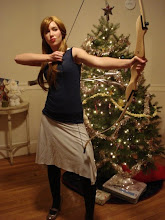A customer walked into Finale this afternoon to a friendly but intense (for a bakery) debate between myself and my metalhead coworker about spiritual beliefs. It had started (harmlessly enough) with me explaining my long list of excellent reasons why reciepts should be handed to the customer or immediately discarded upon completion of a transaction. Being the friendly and accepting person that I am, however, I reassured Co-worker that he was not obligated to follow my procedure, it was merely a suggestion to improve our effectiveness and quality of service.
MH: "That's like saying it's okay not to believe in God, but if you don't you're going to hell."
NM: "Well, not really."
MH: "It's exactly the same!"
NM: "Do you believe in God?"
MH: "No!"
NM: "Admirable. Most people these days hedge their bets with agnosticism."
MH: "Not me!"
NM: "What gets you through your day, then?
MH: ::perplexed look::
NM: What's the point? Why bother?"
MH: "The point is... to be here, I guess."
NM: "To be here and enjoy yourself, or be here and help others?"
MH: "Um...."
CUSTOMER: ::cough cough::
NM: How may I help you, sir?
C: I'll have a dark chocolate decadence to go, please.
NM: Would you like an existential dilemma with that?
Anyway, long bike rides and work hours apparently strengthen the idealist in me. This passage I found by Rilke sums up the hamster wheel of questions that my mind has been running on this week rather well.
"We must assume our existence as broadly as we in any way can; everything, even the unheard-of, must be possible in it. That is at bottom the only courage that is demanded of us: to have courage for the most strange, the most singular and the most inexplicable that we may encounter. That mankind has in this sense been cowardly has done life endless harm; the experiences that are called "visions," the whole so-called "spirit-world," death, all those things that are so closely akin to us, have by daily parrying been so crowded out of life that the senses with which we could have grasped them are atrophied. To say nothing of God. But fear of the inexplicable has not alone impoverished the existence of the individual; the relationship between one human being and another has also been cramped by it, as though it had been lifted out of the riverbed of endless possibilities and set down in a fallow spot on the bank, to which nothing happens. For it is not inertia alone that is responsible for human relationships repeating themselves from case to case, indescribably monotonous and unrenewed: it is shyness before any sort of new, unforeseeable experience with which one does not think oneself able to cope. But only someone who is ready for everything, who excludes nothing, not even the most enigmatical, will live the relation to another as something alive and will himself draw exhaustively from his own existence. For if we think of this existence of the individual as a larger or smaller room, it appears evident that most people learn to know only a corner of their room, a place by the window, a strip of floor on which they walk up and down. Thus they have a certain security. And yet that dangerous insecurity is so much more human which drives the prisoners in Poe's stories to feel out the shapes of their horrible dungeons and not be strangers to the unspeakable terror of their abode. We, however, are not prisoners. No traps or snares are set about us, and there is nothing which should intimidate or worry us. We are set down in life as in the element to which we best correspond, and over and above this we have through thousands of years of accommodation become so like this life, that when we hold still we are, through a happy mimicry, scarcely to be distinguished from all that surrounds us. We have no reason to mistrust our world, for it is not against us. Has it terrors, they are our terrors; has it abysses, those abuses belong to us; are dangers at hand, we must try to love them. And if only we arrange our life according to that principle which counsels us that we must always hold to the difficult, then that which now still seems to us the most alien will become what we most trust and find most faithful. How should we be able to forget those ancient myths about dragons that at the last moment turn into princesses; perhaps all the dragons of our lives are princesses who are only waiting to see us once beautiful and brave. Perhaps everything terrible is in its deepest being something helpless that wants help from us."
- Rainer Maria Rilke
Subscribe to:
Post Comments (Atom)

No comments:
Post a Comment